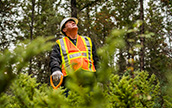Note 26 - Legal proceedings and other contingencies
General
In the ordinary course of business, Shell subsidiaries are subject to a number of contingencies arising from litigation and claims brought by governmental authorities, including tax authorities, and private parties. The operations and earnings of Shell subsidiaries continue, from time to time, to be affected to varying degrees by political, legislative, fiscal and regulatory developments, including those relating to the protection of the environment and indigenous groups in the countries in which they operate. The industries in which Shell subsidiaries are engaged are also subject to physical risks of various types.
The amounts claimed in relation to such events and, if such claims against Shell were successful, the costs of implementing the remedies sought in the various cases could be substantial. Based on information available to date and taking into account that in some cases it is not practicable to estimate the possible magnitude or timing of any resultant payments, management believes that the foregoing are not expected to have a material adverse impact on Shell’s Consolidated Financial Statements. However, there remains a high degree of uncertainty around these contingencies, as well as their potential effect on future operations, earnings, cash flows and Shell’s financial condition.
In certain divestment transactions, liabilities related to decommissioning and restoration are de-recognised upon transfer of these obligations to the buyer. For certain of these obligations, Shell has issued guarantees to third parties and continues to be liable in case the primary obligor is not able to meet its obligation. These potential obligations arising from issuance of these guarantees are assessed to be remote.
Decommissioning and restoration of manufacturing facilities
Industry practice had been not to recognise decommissioning and restoration provisions associated with manufacturing facilities in Oil Products and Chemicals. This was on the basis that these assets were considered to have indefinite lives and, therefore, that it was considered remote that an outflow of economic benefits would be required.
In 2020, the changed macroeconomic fundamentals were considered, together with Shell’s plans to rationalise the Group’s manufacturing portfolio. It was also reconsidered whether it remained appropriate not to recognise decommissioning and restoration provisions for manufacturing facilities.
It was concluded that the assumption of indefinite lives for manufacturing facilities is no longer appropriate, and the need for either recognition of decommissioning and restoration provisions or contingent liability disclosure was reviewed. In 2020, provisions had been recognised for certain shorter-lived manufacturing facilities (see Note 19). For the remaining longer-lived facilities, where decommissioning would generally be more than 50 years away, it was concluded that, while there is a present obligation that has arisen from past events, the amount of the obligation cannot be measured with sufficient reliability. This conclusion was reached on the basis that the settlement dates are indeterminate; and that other estimates, such as extremely long-term discount rates for which there is no observable measure, are not reliable. Consequently, a decommissioning and restoration obligation exists that cannot be recognised or quantified and that is disclosed as a contingent liability.
Pesticide litigation
Shell Oil Company (SOC), along with another agricultural chemical pesticide manufacturer and several distributors, has been sued by public and quasi-public water purveyors, water storage districts, and private landowners alleging responsibility for groundwater contamination caused by applications of chemical pesticides. There are approximately 37 such cases currently pending, seven claims made but not yet filed, and an active subpoena for records. These matters assert various theories of strict liability and negligence, seeking to recover actual damages, including drinking well treatment and remediation costs. Most assert claims for punitive damages. While the Company continues to vigorously defend these actions, in January 2018 an environmental regulatory standard became effective in the State of California, where a majority of the suits are pending. The 2018 standard requires public water systems state-wide to perform quarterly or monthly sampling of their drinking water sources for a chemical contained in certain pesticides. Water systems deemed out of compliance with the regulatory standard must take corrective action to resolve the exceedance or take the potable water source out of service. In response to this regulatory standard, the Company monitors the sampling results to determine the number of wells potentially impacted. Based on the claims asserted and SOC’s history with regard to amounts paid to resolve varying actions, management does not expect the outcome of the matters pending at December 31, 2021, to have a material adverse impact on Shell. However, there remains a high degree of uncertainty regarding the potential outcome of some of these pending lawsuits, as well as their potential effect on future operations, earnings, cash flows and Shell’s financial condition.
Climate change litigation
In the USA, 21 lawsuits filed by several municipalities and/or states against oil and gas companies, including Shell plc, are pending as of December 31, 2021. The plaintiffs seek damages for a variety of claims including harm to their public and private infrastructure from rising sea levels and other alleged impacts of climate change caused by the defendants’ fossil fuel products. A similar suit has been filed by a crab-fishing industry group claiming harm to their fisheries as a result of alleged ocean-related impacts of climate change. In the Netherlands, in a case against Shell brought by a group of environmental non-governmental organisations (eNGOs) and individual claimants, the Court found that while Shell is not currently acting unlawfully, Shell must reduce the aggregate annual volume of CO2 emissions of Shell Group operations and energy-carrying products sold across Scopes 1, 2 and 3 by 45% (net) by the end of 2030 relative to its 2019 emissions levels. For Scopes 2 and 3, this is a significant best efforts obligation. Shell has appealed that ruling. Management believes the outcome of these matters should be resolved in a manner favourable to Shell, but there remains a high degree of uncertainty regarding the ultimate outcome of these lawsuits, as well as their potential effect on future operations, earnings, cash flows and Shell’s financial condition.
Louisiana coast litigation
The State of Louisiana and multiple local governments have initiated 43 lawsuits against more than 200 oil and gas companies, claiming either current or historical oil and gas operations caused or contributed to contamination, land loss and the erosion of the Louisiana coastline. Shell entities are named in 14 of the suits. Although the State and local parishes fail to claim specified amounts, these claims represent potentially material matters. The cases are of first impression, arise out of an untested 1980 Louisiana statute and represent a novel attempt to render illegal operations that federal and state agencies permitted and authorised at the time. Management believes the outcome of these matters should ultimately be resolved in a manner favourable to Shell; there remains a high degree of uncertainty, however, concerning the scope of the claims and the ultimate outcomes, as well as their potential effects on future operations, earnings, cash flows, reputation and Shell’s financial condition. The cases continue to go through jurisdictional challenges with respect to whether the cases should be tried in federal court or state court.
NAM (Groningen gas field) litigation
Since 1963 NAM – a joint venture between Shell and ExxonMobil (50:50) – has been producing gas from the Groningen field, the largest gas field in Western Europe. After smaller tremors in the 1990s and the late 2000s, an earthquake measuring 3.6 on the Richter scale occurred in 2012, causing damage to properties in the affected area, and the area continues to experience tremor/earthquake-type events. NAM has received more than 100,000 claims for physical damage to property – the majority of which have been successfully settled. The Dutch State has taken over the damage-claim-handling from NAM for all claim categories (strengthening, physical damage to property, housing value loss, emotional damages and loss of living enjoyment) while NAM remains financially responsible. In February 2022 NAM commenced arbitral proceedings against the State to get clarity on these financial responsibilities. NAM still faces claims in civil litigation from claimants who elect not to use the government arrangement or from claims pre-dating the governmental arrangements. These claims include, but are not limited to:
- housing claims where NAM was found liable for value loss;
- emotional damages and loss of living enjoyment, around 5,000 claimants; and
- other civil litigation matters.
There remains a high degree of uncertainty concerning the ultimate outcomes and their potential effects on future operations, earnings, cash flows, reputation and Shell’s financial condition.
Nigerian litigation
Shell subsidiaries and associates operating in Nigeria are parties to various environmental and contractual disputes brought in the courts of Nigeria, England and the Netherlands. These disputes are at different stages in litigation, including at the appellate stage, where judgements have been rendered against Shell entities. If taken at face value, the aggregate amount of these judgements could be seen as material. Management, however, believes that the outcomes of these matters will ultimately be resolved in a manner favourable to Shell. However, there remains a high degree of uncertainty regarding these cases, as well as their potential effect on future operations, earnings, cash flows and Shell’s financial condition.
OPL 245
Authorities are investigating Shell Nigeria Exploration and Production Company Ltd.’s (SNEPCO’s) investment in Nigerian oil block OPL 245 and the 2011 settlement of litigation pertaining to that block with regard to potential anti-bribery and anti-corruption laws.
On January 27, 2017, the Nigeria Federal High Court issued an Interim Order of Attachment for Oil Prospecting Licence 245 (OPL 245), pending the conclusion of the investigation. SNEPCO applied for and was granted a discharge of this order on constitutional and procedural grounds. Also in Nigeria, in March 2017, criminal charges alleging official corruption and conspiracy to commit official corruption were filed against SNEPCO, one current Shell employee and third parties including ENI SpA and one of its subsidiaries. Those proceedings are in abeyance. In January 2020, criminal charges alleging disobeying direction of law related to tax waivers were filed in Nigeria against Shell Nigeria Ultra Deep Ltd., SNEPCO, and third parties including Nigeria Agip Exploration Limited (NAE). Those proceedings are ongoing. In March 2017, parties alleging to be shareholders of Malabu Oil and Gas Company Limited. (Malabu) filed two actions to challenge the 2011 settlement and the award of OPL 245 to SNEPCO and an ENI SpA subsidiary by the Federal Government of Nigeria. Both actions are currently stayed awaiting the outcome of appeals filed against procedural decisions. Those appeal proceedings are ongoing. On May 8, 2018, Human Environmental Development Agenda (HEDA) sought permission from the Federal High Court of Nigeria to apply for an order to direct the Attorney General of the Federation to revoke OPL 245 on grounds that the entire Malabu transaction in relation to the OPL is unconstitutional, illegal and void as it was obtained through fraudulent and corrupt practice. On July 3, 2019, the Nigerian Federal High Court upheld objections from SNEPCO and NAE and struck the lawsuit filed by HEDA. The suit was struck because of the statute of limitations and lack of jurisdiction to hear the matter. HEDA has appealed the judgement, which is ongoing.
On December 12, 2018, the Federal Republic of Nigeria (FRN) issued a claim form in the UK against Shell and six of its subsidiaries, ENI SpA and two of its subsidiaries, Malabu as well as two other entities for the amount of $1,092 million plus damages for having participated in a fraudulent and corrupt scheme leading to the acquisition by Shell and ENI corporate defendants in 2011 of OPL 245. The Shell entities were served with proceedings in April and May 2019, following which they, and other defendants, challenged the jurisdiction of the English courts. Following a hearing in April 2020, the English High Court rendered judgement in May 2020, dismissing the claims in England and refusing the FRN’s request for permission to appeal. In September 2020, the UK Court of Appeal also refused the FRN’s permission to appeal, meaning the case is now concluded.
On February 14, 2017, Shell plc received a notice of request for indictment from the Milan public prosecutor with respect to this matter. On December 20, 2017, Shell plc and four former Shell employees including one former executive were remanded to trial in Milan. On May 14, 2018, a trial commenced in the Court of Milan. The FRN was admitted as a civil claimant by a court decision on July 20, 2018. On September 18, 2018, Shell was joined to the proceedings as the civilly responsible party for the damages caused by the alleged illegal acts of the four former Shell employees. Three other Shell entities (Shell UK Ltd, Shell Petroleum Development Company of Nigeria Ltd. and Shell Exploration and Production Africa Ltd.) also joined the proceedings as responsible civile for their respective former employees at that phase of the proceedings. On March 17, 2021, the Court of Milan acquitted the Shell entities and four former Shell employees of all charges on the grounds that there was no case to answer. The Court of Milan published the full grounds for its decision on June 9, 2021. The decision is under appeal.
On September 20, 2018, a guilty judgement was filed by the Milan Judge of the Preliminary Hearing in a separate OPL 245 fast-track trial of two individuals, neither of whom worked for or on behalf of Shell. That decision was appealed to the Court of Appeal which rendered its judgement on June 24, 2021, acquitting both individuals. Separate OPL 245 pre-trial criminal proceedings are pending against another individual who also did not work for or on behalf of Shell.
In February 2019, we were informed by the Dutch Public Prosecutor’s Office (DPP) that they were nearing the conclusion of their investigation and preparing to prosecute Shell plc for criminal charges directly or indirectly related to the 2011 settlement of disputes over OPL 245 in Nigeria. On October 2, 2019, the US Department of Justice (DOJ) informed Shell that it was closing its inquiry into Shell in relation to OPL 245. We understand that the decision was based on the facts available to the DOJ, including ongoing legal proceedings in Europe. On April 22, 2020, the United States Securities and Exchange Commission notified us that it had also closed its inquiry into Shell in relation to OPL 245. There remains a high degree of uncertainty around the OPL 245 matters and contingencies discussed above, as well as their potential effect on future operations, earnings, cash flows and Shell’s financial condition. Accordingly, at this time, it is not practicable to estimate the magnitude and timing of any possible obligations or payments. Any violation of anti-bribery, anti-corruption or anti-money laundering legislation could have a material adverse effect on Shell plc’s earnings, cash flows and financial condition.
Simplification of share structure
On December 20, 2021, the Board decided to proceed with the simplification (as outlined in Note 1). Preceding this decision, a proposed bill on the Dutch dividend withholding tax (DWT) exit tax charge and subsequent amendments were submitted to the Dutch Parliament imposing a DWT exit tax charge on any company that transfers its tax residence to a country that does not levy dividend withholding tax, such as the UK. The amended bill was submitted to the Dutch Council of State for advice and is at an early stage of discussion in the Dutch Parliament. Having considered a range of factors including legal advice, following the transfer of the Company’s tax residence it is expected that the Company will ultimately not incur any DWT exit tax cost.









